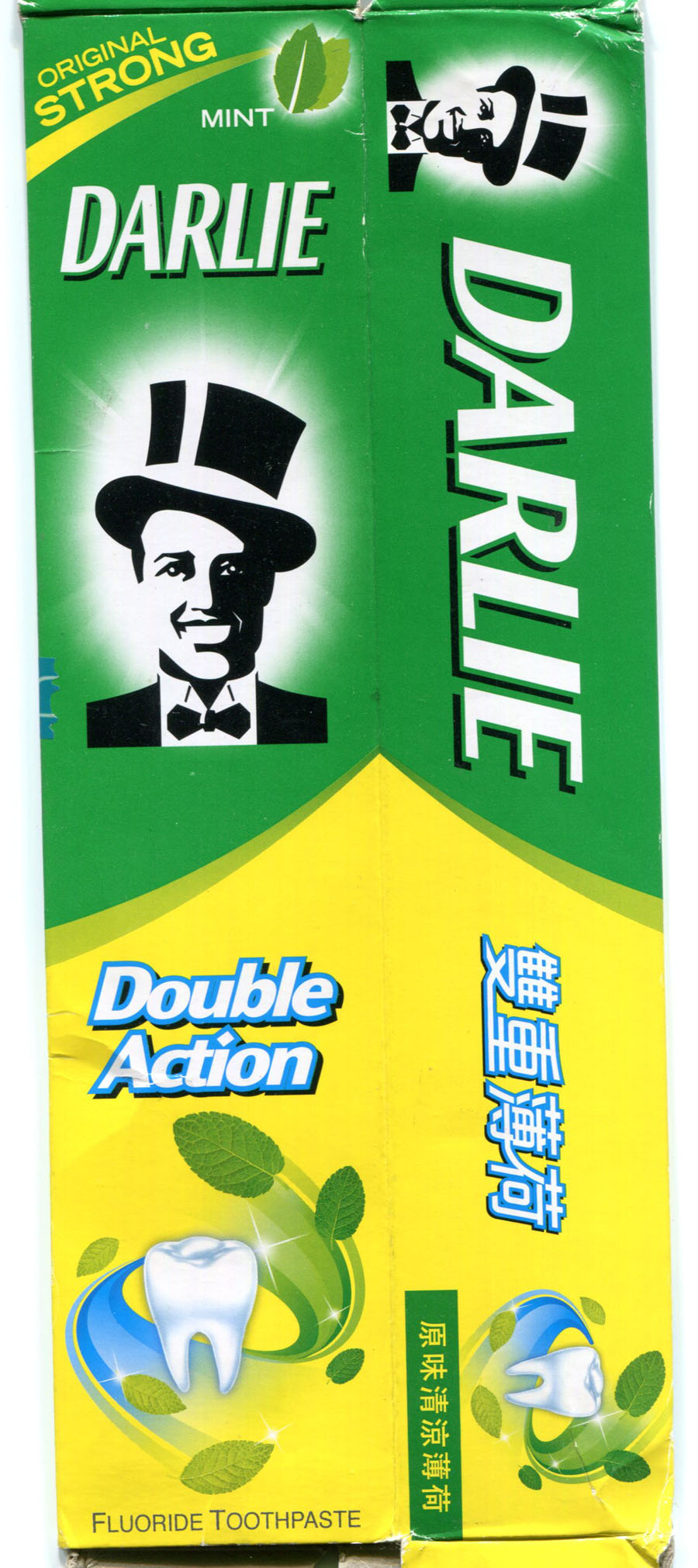☞ How do you prefer your racism, dark or lite?
Racism dark seems fairly hard to come by in these parts. Not like when my mother was a fifteen year-old girl, fresh from Sicily and staying with relatives in San Jose, California. She witnessed one of the estimated 4800 post-civil war lynches. Fresh off the boat from an island having hosted invasions of every kind— Greek tyrants, Viking roughnecks, Norman crusaders, Moorish hack blades, American tourists— she arrives in California to see a black man, merely suspected of murdering a little girl, hanged in a public park. I grew up with that story and so was prepared for the fact that prejudice knows no boundaries. Funny part is, the largest group of lynch victims in US history were Sicilians in New Orleans.
Hatred abounds. It merely requires a new name to stay alive. For that reason the term racist has undergone a switcheroo from dark to lite.
Since racism is still estimated to be such a gross part of current American life, proper discernment of that particular ism begs for enlightenment. And since the election of the first black president has not only failed to abate the racial conflict— actually widened it— flood gates of corruption under the same name have also opened wider. So the old familiar kabuki of racism still plays in hearts and minds. The mask of racism dances before us in every avenue, stage, and podium. Dissection is required.
The ability to distinguish differences between things now earns a frown from jargheads. The main thrust in education among elites appears to be devoted largely to extinguish distinctions. Some parents even set about blurring something as basic as distinguishing between little boys and girls. No wonder then that the power of distinction, always a problem for the American mind, has frozen over. So our purpose here is to search out a working distinction between “racism dark,” which hangs like a noose around American history, and “racism lite.”
☞ RACISM DARK
requires little identification. People held in slavery, their suffering in antebellum America, Jim Crow laws afterward, the aforementioned lynchings: all and more stand out as a great big reminder of past injustice. We are constantly cued to these agonies in story and the blues. One of the most powerful rendering for me was Richard Wright’s story “Bigger Goes Home,” wherein a young boy is innocently caught up in a death hunt and witnesses his friend burned to death. And all for merely wandering up to a swimming hole and seeing a white woman unclothed. A Jim Crow horror tale out of American literature.
☞ RACISM LITE
In the throes of racism lite, white boys are now whipped. Not as fiercely as blacks were during slavery— thank goodness for that— but invisibly whipped by guilt. It’s as if Charlie Manson’s strategy is bearing fruit. Remember, Charlie’s killing spree was based on the ingenious theory that his staged murders would cause “war between blackie and whitie,” and blackie would win. But he wouldn’t know how to control society, and that would leave it up to King Charlie to rule. Well, Charlie’s gone. So we are bereft of a ruler, but Charlie’s decree still seems to be in effect. America is living Charlie’s legacy with “blackie” upholding his part of the fight, not so much by murder as by suppression, with strategies of racism lite. A kind of reverse Jim Crow. More like John Pigeon, where any white is guilty.
☞ What was at first celebrated as a principle agent of victory over slavery— that is, the inauguration of a system based on individual freedom and equality— has evolved into a problem for many who don’t know that individuals could have been born from another system. It’s to their credit that the founders could have so radically discarded the old system and created another. Which is what happened in America when the revolutionary government was created exclusively by property holding men. And some of those— ye, gods!— slave-owners! That’s a distinction one really has to understand but appears to be far beyond the capability of many of our newly “educated.” So the message got slammed along with the messengers: dead white guys can’t be believed. That weird distinction has worked into a seemingly unbreakable cycle of swapped and inherited guilt trips that takes a nation, if not the world, on its number one Kabuki of Apology.

☞ POSITIVE RACIAL DISCRIMINATION
If it seems that racism lite is merely a gimmick, the reader should know that Trying Times is merely following the lead of a person who served in the U.S. Department of Justice, Lani Guinier. She rebelled against Ronald Reagan’s move to reduce the Civil Rights apparatus in the department because so much headway had already occurred in that avenue; Guinier, of course, did not agree. She felt the nation should go further in righting civil rights, and so she proposed some of what were then radical proposals. When she was nominated by President Clinton as an Assistant Attorney General to head the Civil Rights Division, it caused such a furor that even a lefty like Billy Jeff had to back off. Too toxic even for his administration, Clinton withdrew her nomination— even though female, even though black— when it came out that Guinier advocated “positive racial discrimination.” In other words— ding ding— racism lite.
☞ As stated above, racism dark is getting harder to come by. Not too many burning crosses are to be seen on the horizon. Words, therefore, along with “appropriate attitudes” are necessarily invented to support the new racism. By these means, racial preference has insinuated itself into every organizational form, both civilian and politic. In the Golden Eagle Casino of the United States, with everyone playing the race card, the hole card is racism lite, and losers pay big.
☞ A recent example of how big everyone pays comes by an account of a fellow justice worker and former assistant to big mama Lani Guinier , Eric Holder. Acting as Attorney General under Obama, and furiously fast in supplying guns to cartels, Holder also enforced a lessening of punitive treatment for students of color. Perhaps it was similarity in the color of cartels and hoods which inspired the policy of going lite on troublesome students. Whatever the reason, the policy eventually devolved into an unsurprising increase of violence on campus. One young recipient of this more understanding and lite punitive policy was spared punishment and attention until he shot up a bunch of students in Parkland, Florida. But no matter, the purposes of racism lite had been served.
☞ Even larger payment than those incidental types of racial collisions add up to greater tragic loss suffered by an entire group of people. This would be the existential denial into the brotherhood of humanity– something everyone seems to be sqwaking about but rarely demonstrating. Special treatment is isolation, separation. In sum, everyone should have the right to get funky. Without that right, members of any group are deprived of the complete human experience— much like jerking a villager away from home to be a member of your own little plantation.
The comedy group Firesign Theater offered a favorite interpretation of our democracy with their bit titled We’re All Bozos On This Bus. That title alone may be the most democratic estimate of our society, wherein all uphold the sovereign right to be Bozos, some more than others. By that measure, on this bus the big bosses, big stars, and the big politicos are merely bigger Bozos– whatever their color.
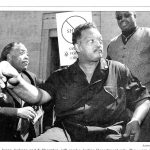
☞ PROBLEM PROFITEERS
If one makes a living based on pigmentation, then that person serves some form of racism. Pigmentation also qualifies him or her for “problem profiteer.” Such was the label given by Burgess Owens, former NFL player and critic of people like Al Sharpton. Owens refers to him as one of those who profit over race misery.
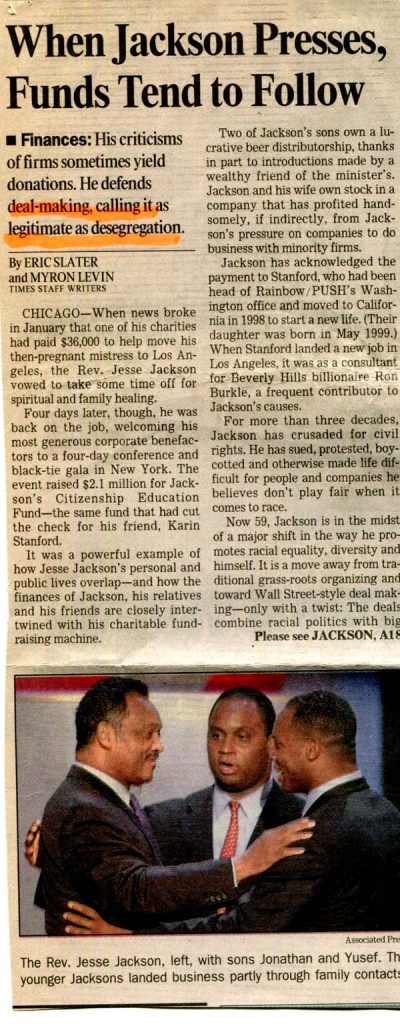 Problem profiteer makes a rather exquisite label affixed to this species of vulture for the simple reason that it establishes the idea of profiteering in a sorry field of circumstance, the way war profiteering enriches people in the business of war. And that seems a worthy comparison of what’s going on politically: profiting on a culture war.
Problem profiteer makes a rather exquisite label affixed to this species of vulture for the simple reason that it establishes the idea of profiteering in a sorry field of circumstance, the way war profiteering enriches people in the business of war. And that seems a worthy comparison of what’s going on politically: profiting on a culture war.
☞ DARKIE AND DARLIE
As culture war profiteers go, they often assume something of a gangster style. They also assume simultaneously, as Thomas Sowell is fond of pointing out, “the moral high ground.” From that high perch of “sensitivity,” their brand of morality is applied as a bludgeon. Under the shield of “moral authority” Reverend Jesse Jackson has enriched himself by these methods of pressure. This technique was even admitted by the liberal LA Times in a March 2001 headline: “When Jackson Presses, Funds Tend to Follow: His criticisms of firms sometimes yields donations. He defends deal-making, calling it as legitimate as desegregation.”
Lordy, he has a name for these high-pressure deals: “legitimate desegregation.” Neat! It’s just so close to “Positive Racial Discrimination.” But whatever the jargon slang meaning, whatever kabuki chant, it’s known here at Trying Times by another name:
☞ Test question: Racism what?
So by authority vested in Reverend Jesse of the going forth to preach— and activate— the teachings of racism lite, the honorable gentleman resides among the most profitable of problem profiteers. The reverend casts his net of “moral authority” as wide as all America— and Asia as well. Jackson’s mawrel authority even reached out to grab Darkie toothpaste sold in Hong Kong.
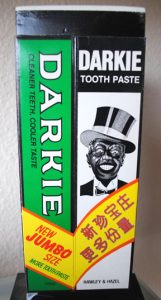
☞ After seeing it advertised on the hotel TV, I couldn’t believe that such a thing existed. We go to foreign places like Hong Kong to see exotic things: pagodas and temples and the like. But to see a tube of toothpaste with the big grinning face of an old-fashioned minstrel man modeled on Al Jolson in black face, complete with top hat and labeled Darkie, such an archaism from the English past was strangely amusing in its unexpected absurdity.
So Darkie was purchased. At the first brushing, I was completely enthusiastic about the product because it seemed the best of its kind. But my satisfaction expanded into exhilaration when my whole life changed. For not only was Darkie the best toothpaste I’ve ever used, but after continual usage my dance step began to improve. In fact, I hadn’t danced in years before that. Not only dancing, but I started singing like Sammy Davis Jr., and my sex life increased formidably.
Then after one ill-fated good will trip to Hong Kong, along came Jessie Jackson to correct the situation. The American Colgate company had bought half interest in Hawley & Hazel, makers of Darkie. That British company, in turn, bought half interest in the moral authority commanded by the Reverend Jackson from Chicago. All the way from State Street and beyond, came forth the crusader, and lo, he was fired with indignation. Exercising his mawrel awthority, Jessie got the Darkie people to change the label of their toothpaste to something considered less offensive. It became Darlie. The guy on the label, still dressed in dark formal clothes, was no longer a black man with a big toothy watermelon-eating grin. The Darlie guy was a vaguely androgynous pretty boy of color, but not colored. No problem.

For me, it was still the same minty tooth paste leaving the same clean taste. Yet things began to change. At first, barely noticeable. I could still sing, but off key. And I could still dance, but at a less enthusiastic pace. Worst yet, I abandoned tap dancing for the fox trot, and my shuffle slowed down to this awkward ass-wagging movement like you see at honkie country clubs. Sex became a bore. I was convinced of the change when I found myself taking elocution lessons so that I could learn to speak posh, like the new guy on the Darlie label would talk. Instead of cursing somebody out like “yo mama, you jive ass mofo!” I would speak in measured tones and say, “My good fellow, you cannot most assuredly feel that!”
Finally I noticed developing an excessive taste for mint chocolate after my fish and chips, and then I started brushing with Colgate. And I have only Jessie Jackson and his mawrel awthority to thank. He is to be commended for saving me from Darkie Toothpaste.
☞ REPARATIONS
Racism lite is most revealing by the lite of one curious notion heading the problem profiteering portfolio, the ultimate shakedown: reparations. Payments are due, some feel, for the past sin of slavery. Never mind that there hasn’t been a slave in the country for generations, some are charged with the conviction that black citizens should receive payment for being descended from slaves. No consideration however for the people, who were not black and yet fought and died against slavery.
To be sure, the reparations claim has been modernized. It’s been brought up to jargon speed in order to pump up the list to include sins beyond slavery, segregation and the lot, but slavery is still the tune and tempo of the whole jive. In this perpetual reconstruction movement forced upon us as dues for being American, one might ask about consideration, at least, if not compensation for New Englanders who produced maple sugar to counter Caribbean sugar and the slave trade involved in it. Or the people who participated in the underground freedom railway— and got lynched for their trouble. But most especially, those hundreds of thousands who perished in the American Civil War.
☞ THE CRATER BATTLE
In keeping with the nature of racism, denying people the right to be people generates seas of chaos, the American Civil War a prime example. Right at the outset, freed blacks became political fodder. Even Lincoln was at first undecided how to handle the situation. Some generals allowed the freed slaves to flee to the North, thousands camping out in their future home in District of Columbia. Others, including the northern commanding general for a time, George McClellan, were for returning them to their southern “owners.”
But the Trying Times vote for most egregious ambivalence concerning treatment of its black citizens, as well as the birth of racism lite, has to go to the Crater Battle which occurred in 1864 during Grant’s siege of Petersburg, Virginia. The most notorious screw-up in the Civil War, if not in military history, the Crater Battle was the sorry result of commanding officers unsure of “what to do with the Negroes.”
The battle plan started with a strategy devised by soldiers on the picket line, facing off the southerners yards away. As coal miners in a Pennsylvania unit, they got the idea to tunnel under the picket line, set an explosive charge large enough to blow a hole behind the line and send in troops to get the drop on the rebs. And that’s what happened, the first part anyway. The latter part, not so good. The plan had been changed.
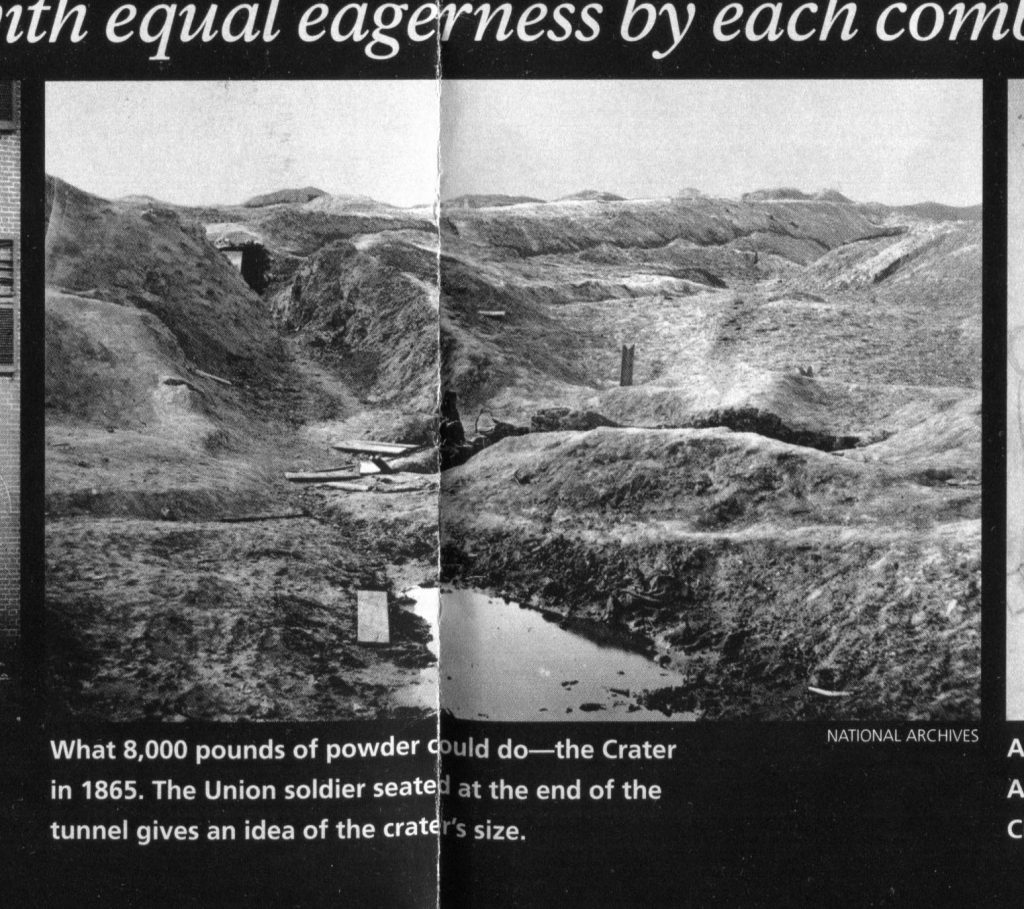
For months the soldier-miners tunneled under the picket line, and then they followed up with a connecting tunnel at right angles to the entry tunnel which ran parallel just behind the enemy line. This parallel tunnel was so packed with explosives that it brought holy hell out of the ground when it went off, an explosion that hurtled carts and horses up into the air. It blew an enormous moon crater in the ground: hence the name Crater Battle.
☞ So much success for the technological achievement, but not for the political. Sound familiar? Technology screwed over by politics? Well, look at what happened.
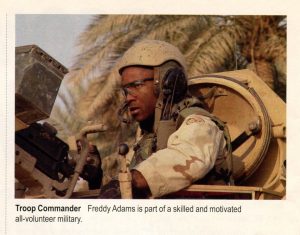 After the hole was blown behind the lines, the first proposed troops of engagement for advancing through the tunnel was to be a unit of black soldiers. But the commanding general got drunk the night before, so he was no use. Meantime, the other officers got cold feet about sending black soldiers on the mission. Might not look so good. Might look like they were being sacrificed. Thus, at the last minute the black troops were pulled, encasing in history an early muddle over racism— no, positive discrimination— that we have come to know so well.
After the hole was blown behind the lines, the first proposed troops of engagement for advancing through the tunnel was to be a unit of black soldiers. But the commanding general got drunk the night before, so he was no use. Meantime, the other officers got cold feet about sending black soldiers on the mission. Might not look so good. Might look like they were being sacrificed. Thus, at the last minute the black troops were pulled, encasing in history an early muddle over racism— no, positive discrimination— that we have come to know so well.
 ☞ Sometimes it seems that the name of history should be changed to the study of irony: the Crater Battle gives good reason. Irony, for example, that black soldiers have become major participants in American fighting forces, distinguishing themselves mightily in battle and faithfully in service; Bob Woodson of the Freedom Foundation reminds the world that no black soldier has ever been tried for treason. But that would have required too much foresight for those bureaucratic minds in charge. Yet it’s hard to believe they wouldn’t have known of the attempt on Fort Wagner a year before in South Carolina by an all-black regiment who fought to the last man (celebrated in a recent motion picture, Glory). Those officers in charge of the attack in Petersburg were worried instead over what the papers might say about their treatment of the Negroes.
☞ Sometimes it seems that the name of history should be changed to the study of irony: the Crater Battle gives good reason. Irony, for example, that black soldiers have become major participants in American fighting forces, distinguishing themselves mightily in battle and faithfully in service; Bob Woodson of the Freedom Foundation reminds the world that no black soldier has ever been tried for treason. But that would have required too much foresight for those bureaucratic minds in charge. Yet it’s hard to believe they wouldn’t have known of the attempt on Fort Wagner a year before in South Carolina by an all-black regiment who fought to the last man (celebrated in a recent motion picture, Glory). Those officers in charge of the attack in Petersburg were worried instead over what the papers might say about their treatment of the Negroes.
Sound familiar?
So the black troops were pulled back at the last minute despite the fact that they were the only ones trained for the assault. Instead, their replacements were white soldiers who had little or no idea of the attack. They were just a bunch of Union boys who wanted to help Mr. Lincoln keep the nation together.
☞ If you don’t like the word irony in estimating the situation, try fiasco, because that’s the one to describe what happened after that chickenshit decision.
When the unwitting untrained white soldiers emerged at the other end of the tunnel and found themselves inside a big blown crater, they didn’t know what to do. The southern troops, on the other hand, did. The rebel troops had heard the tunneling all along. They had probed, but couldn’t actually hit the tunnel dig. Yet they knew it was there. So after a colossal explosion drew them to the spot, they found a bunch of bewildered federal troops down at the bottom of a big hole.
Fish in a barrel.
White fish in a barrel.
And what’s worse, when the black troops followed out of the tunnel, they were even more savagely massacred. Those particular rebel democrats firing upon the black troops considered them to be traitors, and therefore showed no mercy.
☞ Therefore, in this age of supposed reparations, a question: Whose descendants should be compensated for the cessation of slavery— the ones who first charged into the crater, or those who followed into the crater to be slaughtered?
And how about the rest of us who have to endure the nonsense slavery still generates? When does it cease? And how about those “descendants of descendants,” with their own African-American mind-forged manacles, with their positive racial discrimination, straining for different ways to bedevil the rest of us— white and black— with their own peculiar brand of racism lite?

☞ THE CRATER IS FILLING AWAY
A visitor to that crater today will hardly find any trace of it. If it weren’t marked, you’d never know there was once a canyon of a hole there. They’ve allowed the crater to fill in and cover over, perhaps as a way of covering over and forgetting the terrible incident that occurred there. But maybe people should think about opening it up again, enlarging it so that people could gather and follow those ill-fated  troops through that tunnel. A march could be made out of it, with people singing, arms locked together the way they did in Atlanta, and their song echoing through the tunnel north and south. Only the words might be changed from We Shall Overcome; someone could write lyrics to Rodney King’s question: Why Can’t We All Just Get Along? They could even forgive the hoses and dogs, or at least try to forget ‘em. And the march would really get off to a great start with an invocation by Justice Clarence Thomas quoting the famous speech by Martin Luther King about content of character to start people walking out of their tunnel, dropping their hyphens along the way. They could be like talk show host Larry Elder, who rejects the African-American hyphen handle and only refers to himself as an American who happens to be black.
troops through that tunnel. A march could be made out of it, with people singing, arms locked together the way they did in Atlanta, and their song echoing through the tunnel north and south. Only the words might be changed from We Shall Overcome; someone could write lyrics to Rodney King’s question: Why Can’t We All Just Get Along? They could even forgive the hoses and dogs, or at least try to forget ‘em. And the march would really get off to a great start with an invocation by Justice Clarence Thomas quoting the famous speech by Martin Luther King about content of character to start people walking out of their tunnel, dropping their hyphens along the way. They could be like talk show host Larry Elder, who rejects the African-American hyphen handle and only refers to himself as an American who happens to be black.
JoCo
